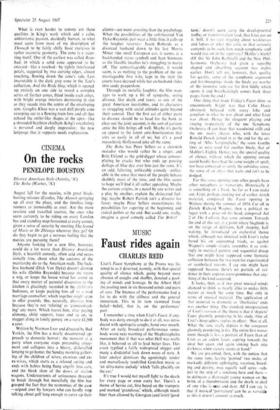CINEMA
On the rocks
PENELOPE HOUSTON
Divorce American Style (Astoria, 'A') The Bobo (Warner, `A') August lull for the movies, with great block- busting reissues (Exodus, The Alamo) springing up all over the place, and the timeless long- runners as immovable as ever. Are the more resolute and travelled tourists, the ones who seem currently to be riding on every London bus and standing map-festooned at every corner, given a sense of security by meeting The Sound of Music or Dr Zhivago wherever they go? Or do they begin to get a nervous feeling that the movies are pursuing them?
Anyone looking for a new film, however, could do a lot worse than Divorce American Style, a heartfelt comedy, often acid and occa- sionally true, about what the customs of the matriarchy do to the American male. The luck- less husband (Dick Van Dyke) doesn't divorce his wife (Debbie Reynolds) because she wears a wig, or keeps the house wired for sound so that every mutter of parental dissension in the kitchen is gloatingly recorded in the ,:hildrkm's bedroom, or keeps packing him off to a mad marriage counsellor; which together might seem to offer grounds. She, naturally, divorcos him because they're not 'relating' or 'communicat- ing' any more. Which leaves him, alter paying alimony, child support, taxes and SO on, to stagger along in lonely penury on a mere £1,500 a year.
Written by Norman Lear and directed by Bud Yorkin, the film has a neatly documented ap- proach to domestic horror: the moment at a party when everyone stops pretending enjoy- ment and collapses into a bleary, dishevelled longing to go home; the Sunday morning gather- ing of the children of wives, ex-wives and ex- ex-wives, which starts as a relaxed outing and ends with babies being flung angrily into cars, and the bleak slam of the doors of station -wagons. Undercurrents of seriousness threaten to break through but mercifully the film has grasped the fact that the economics of the case —argued over by lawyers who can hardly stop talking about golf long enough to carve up their
clients—are more arresting than the psychology. When the possibilities of the soft-hearted Van Dyke-Reynolds pair wear a little thin, it calls up the tougher reserves: Jason Robards as a divorced husband down to his last Morris Minor (the small European car, it seems, is a backhanded status symbol) and Jean Simmons as the likeable incubus he's struggling to marry off. The unmarriageable daughter, it would seem, is as nothing to the problem of the un- marriageable first wife, kept in the style the courts have decreed while her ex-husband slides into seedy pauperdom.
Through its metallic laughter, the film man- ages to work up a bit of sympathy, seeing divorce, like death and taxes, as one of the great American inevitables, and its characters as struggling with social attitudes quite beyond their control. That the first act of either party to divorce should be to head for the bank to clear out the joint account, is the sort of cartoon antic the film brings off well. Maybe it's partly an appeal to the latent anti-Americanism that stirs so easily in all of us; but it's a good masochistic Hollywood joke all the same.
The Bobo has Peter Sellers as a clownish matador who would rather be a singer, and Britt Ekland as the gold-digger whose armour- plating he cracks but who ends up pouring dollops of blue dye over him just the same. It's an odd, faltering, unlikeable comedy—unlike- able in the sense that most of the people behave shabbily most of the time, and the film seems to hope we'll find it all rather appealing. Maybe the curious origins, in a novel by one writer and a play by another, explain the dislocated feel- ing; maybe Robert Parrish isn't a director for farce; maybe Peter Sellers overestimates the possibilities for capering at the beginning and stoical pathos at the end. But could one, really, imagine a good comedy called The Bobo?






























 Previous page
Previous page